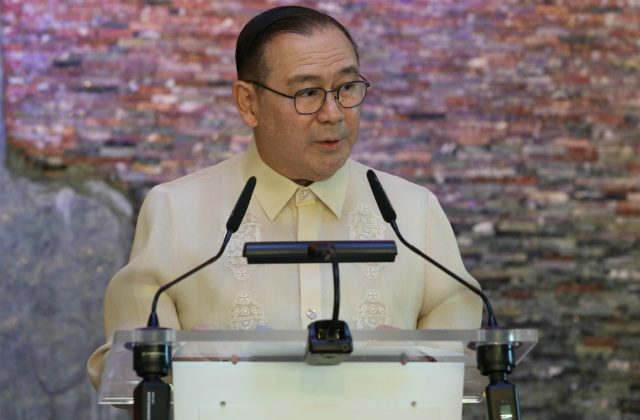SUMMARY
This is AI generated summarization, which may have errors. For context, always refer to the full article.

MANILA, Philippines (UPDATED) – The Philippines threatened 18 countries, including Australia and the United Kingdom, that voted to adopt a United Nations Human Rights Council (UNHRC) resolution urging action against drug war killings in the Southeast Asian country.
“The Philippines rejects this resolution. It cannot, in good conscience, abide by it. We will not accept a politically partisan and one-sided resolution so detached from the truth on the ground,” Foreign Secretary Teodoro “Teddyboy” Locsin Jr said.
Locsin said the Philippines’ foreign policy is “friend to friends, enemy to enemies, and a worse enemy to false friends,” and no longer “friend to all, enemy to none.”
“We renew our solidarity with our true friends who have stood by us in this farce. But we will not tolerate any form of disrespect or acts of bad faith. There will be consequences, far-reaching ones,” Locsin said.
This comes after 18 out of 47 member-countries backed an Iceland-proposed resolution that asked UN rights chief Michelle Bachelet to write a comprehensive report on the Philippine situation and present it to the UN rights council.
The following countries voted to adopt the resolution:
- Argentina
- Australia
- Austria
- Bahamas
- Bulgaria
- Croatia
- Czech Republic
- Denmark
- Fiji
- Iceland
- Italy
- Mexico
- Peru
- Slovakia
- Spain
- Ukraine
- United Kingdom
- Uruguay
The resolution also urged the Philippine government to “take all necessary measures to prevent extrajudicial killings and enforced disappearances, to carry out impartial investigations and to hold perpetrators accountable, in accordance with international norms and standards, including on due process and the rule of law.”
Locsin, however, pointed out that the UN resolution “was not universally adopted,” and “therefore its validity is highly questionable.”
He said that the resolution “was pushed with the arrogance that developing countries must not stand up” to Western countries “even if we can and as we hereby do.”
“They sought to bring a people and a country, with an unblemished human rights record, down to the level of authors of atrocities the world must not forget,” the Philippines’ top diplomat added.
In a statement, the Philippine National Police (PNP) said matters of foreign affairs were beyond its authority to address, but that it would “remain vigilant” to prevent the occurrence of crime.
It said police would continue to enforce the law “following established operational procedures” with the “utmost respect for human rights.”
The PNP has been the administration’s main weapon in what President Rodrigo Duterte said would be a “relentless” and “chilling” operation. – with a report from Sofia Tomacruz/Rappler.com
Add a comment
How does this make you feel?
There are no comments yet. Add your comment to start the conversation.